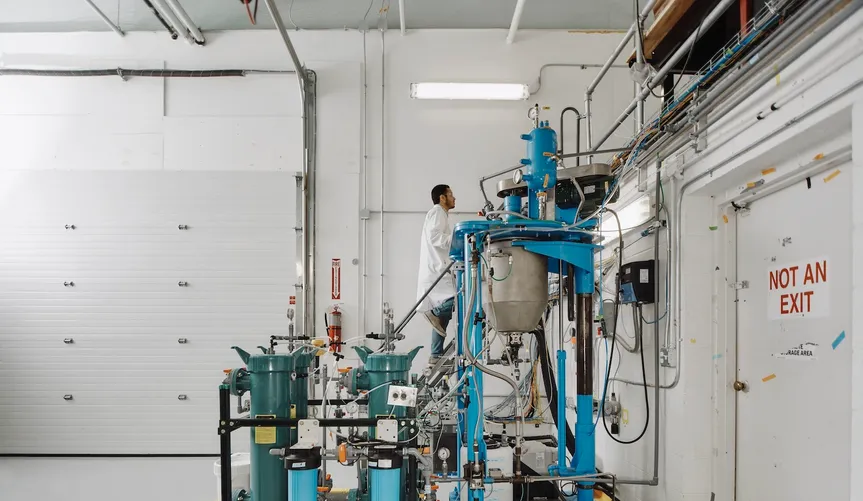
Under the Biden administration, the federal government gave out billions of dollars to companies looking to slash the planet-heating emissions from concrete, cement, and asphalt.
Since President Donald Trump took office in January, the future of that support for low-carbon materials has been thrown into question. The Environmental Protection Agency has already canceled millions of dollars in grants for the industries, and the administration is considering deep cuts to the Energy Department office in charge of a $6.3 billion industrial decarbonization program that includes major cement and concrete projects.
But bipartisan legislation the House of Representatives passed in a 350-73 vote last week would give the Department of Energy a clear mandate to develop a full program to research, develop, and deploy clean versions of the building materials.
Dubbed the IMPACT Act — short for the Innovative Mitigation Partnerships for Asphalt and Concrete Technologies Act — the bill marks just the first step of a push in Congress to bolster the nascent industry.
A second, separate bill introduced in the House just weeks ago as the 2.0 version of the legislation would allow state and municipal transportation departments to pledge to buy future output of manufacturers of low-carbon concrete, cement, and asphalt.
Sister legislation in the Senate combines features from both bills. Advocates say a bill that blends the legislation together could soon pass in both chambers as part of the next federal highway budget.
Concrete and asphalt together comprise nearly 2% of U.S. greenhouse gas emissions. Most of concrete’s emissions stem from its key ingredient, cement, which on its own makes up as much as 8% of the world’s carbon output.
Since roughly half of all cement and concrete in the United States is sold to governments paving roads, patching sidewalks, and building bridges, giving state and local agencies the power to guarantee future purchases of green products could help startups in the space take off, said Erin Glabets, a spokesperson for the Massachusetts-based low-carbon cement maker Sublime Systems.
“Having the weight of the federal government and ultimately having that flow through the states to support the use of clean, innovative cements in our public infrastructure is really the best thing a company working in this field can ask for,” she said.
“We’re hopeful and enthusiastic,” she added. “That’s a really powerful buying signal.”
Unlike traditional manufacturers who use a carbon-intensive process to break down limestone in fossil-fueled kilns fired up to 1,400 degrees Celsius, the company makes a replacement for Portland cement — the most common variety — using electricity and alternative materials that don’t generate carbon as a byproduct.
Sublime is currently building its first commercial-scale plant in Holyoke, Massachusetts, with money it was awarded last year through the Energy Department’s Office of Clean Energy Demonstrations (OCED) — the office established in 2021 under the bipartisan infrastructure law whose more than $20 billion budget is staring down Trump’s chopping block.
It’s not the only such project relying on support from the under-fire office. The federal government put up $500 million last year to equip Germany-based Heidelberg Materials’ new cement plant in Mitchell, Indiana, with hardware to capture and store carbon emissions.
The facility is a rare example of a carbon capture project backed by the Sierra Club, which typically opposes technology to filter CO2 emissions out of power plant smokestacks as a bid to prolong the use of fossil fuels.
Oakland, California-based startup Brimstone won a $189 million grant last March from the same office to build a first-of-a-kind commercial-scale plant to demonstrate its technology that converts calcium-bearing silicate rocks into Portland cement with significantly lower emissions.
In total, OCED pledged to support $1.5 billion worth of low-carbon cement and concrete projects through the Industrial Demonstrations Program.
Passage of the IMPACT Act comes as several states move forward with Buy Clean policies that aim to boost low-carbon building materials.
In 2017, California became the first state to pass such a law, and the California Air Resources Board in March released a draft decarbonization strategy for the cement sector.
Eight other states, including Colorado and Minnesota, have since followed suit on Buy Clean policies. But states have limited purchasing power compared to the federal government, and in any case procurement power itself is not enough for the industry to take off — research and development funding is needed, too.
That’s what makes the federal bills so significant, said Harry Manin, the Sierra Club’s deputy legislative director for industrial policy and trade.
“When it comes to the supply side, actual money to demonstrate these technologies has been more the bailiwick of the federal government,” he said.
While Democratic sponsors such as U.S. Rep. Valerie Foushee of North Carolina may see the bills as climate legislation, Manin said the GOP recognizes “it’s important to protect these industries domestically.”
“They understand tariffs aren’t enough,” Manin said.
To that end, he said, Sen. Bill Cassidy from Louisiana is working to convince fellow Republicans to back separate legislation that would establish a carbon border adjustment mechanism, sometimes called a carbon tariff, to slap levies on imports produced in heavily emitting countries such as China and India.
But the real selling point, Manin said, is that cleaner building materials will ultimately mean cheaper building materials.
“Yes, these materials come with a premium in the short term, but since we’ll eventually commercialize materials that take far less energy to make, ultimately we’re going to be lowering costs,” he said. “That’s why Republicans are so interested.”